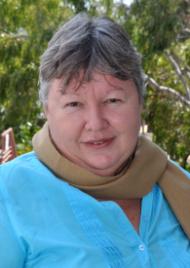People with a disability need voice heard - research shows
Published on 07 September, 2010
All people with a disability benefit from a person-centred approach to their living circumstances, according to a CQUniversity researcher.
Masters student Julie Mann has been conducting a case study on a ‘Host Home Care' model of accommodation support for a person with a disability.
LINK HERE to read about positive feedback to our disability survey

Researcher Julie MannThe model is built on a framework whereby a person with a disability resides in the home of a paid staff member and the person with a disability and their family have direct input into the living situation.
Julie said her research suggests that the Host Home Care model provides a viable alternative for individuals with a disability who require a different accommodation model to what is currently on offer.
"In this case study, the person with a disability benefits from the continuity of one staff member as opposed to a group of staff members who are employed on an 8 or 12-hour rotational shift," Julie explained.
"The model also enables the person with a disability to live a life that has a ‘person-centred' approach, not an organisational or institution-centred approach."
She said the model also presents more ‘real life' opportunities, particularly spontaneous activities, rather than contrived activities that are programmed into a person's life.
Julie believes the Host Home Care model provides an alternative to ‘group homes' where people with a disability collectively reside with other people with a disability.
"The Group Home Model is often viewed as ‘co-forced tenancy' whereby people with a disability do not have the option of choosing who they share their home with."
Other research that Julie is involved in looks at whether people with a disability are included in mining communities.
The concept of social apartheid explores how people with a disability are segregated in communities and this research explores that concept in mining communities.
"I chose to research disability related topics for many reasons but particularly because disability research that involves people with a disability from the 'inside' is largely overlooked.
"Disability related research from the 'outside' is not unusual, however involving someone with a disability in the actual research helps in some small way, to address the power imbalance that people with a disability inherently experience," she said.
"Irrespective of abilities, every human being has something to contribute to the table of life but more importantly, most of us forget that we are only temporarily able bodied - the experience of disability can be one second away for all of us."
Before joining the University as a research student and then research worker, Julie worked in the disability sector for 20 years. She has worked as a Remote Area Coordinator encompassing towns from Longreach to Birdsville and has also worked in regional areas, both in the government and community sector.

